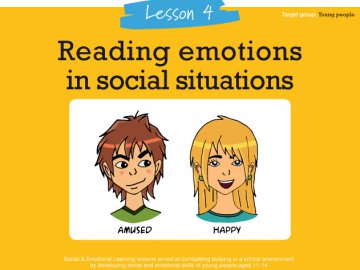ENABLE (European Network Against Bullying in Learning and Leisure Environments) is an EU-funded project (2014 - 2016) which combats bullying and contributes to the well-being of young people aged 11-14 through a unique blend of social and emotional development and peer education.
Using a unique approach that combines social and emotional learning (SEL) with Peer Support, ENABLE strives to provide school staff with the skills, knowledge and confidence that can help them establish an effective student Peer Support scheme in their schools and develop their students’ social and emotional skills.
The target audience for ENABLE is young people aged 11-14 although the programme can be adapted for use by other ages. The ENABLE partner countries are the UK, Denmark, Croatia, Belgium and Greece.
The ENABLE Project
What ENABLE achieved
ENABLE has been rolled out in 6 countries: Belgium (in Dutch and French), Croatia, Denmark, Greece, UK and Romania. Interestingly, a teacher who won a trip to the Hackathon event and ambassador training in October 2015 has translated the resources into Romanian herself, and trained 250 pupils and 30 teachers in 10 schools.
In total, ENABLE has reached 15,738 pupils and 541 teachers in 119 schools, with teachers from another 1000 schools in Croatia having attended ENABLE information sessions. It has trained 300 peer supporters who are now leading activities in the UK, Greece and Croatia.
The Danish consortium partner has focused on reaching the more vulnerable young people and training other national helplines, and has reached an estimated 4,000 young people. This goes way beyond projected goals at that start of implementation, to reach 5000 young people, including 1000 “at risk” children, in 35 schools.
The ENABLE project also had success reaching out for two non-traditional groups: migrant children and children with special needs.
Have you used the ENABLE programme?
If you already know ENABLE and have started using our resources, please let us know – enable@swgfl.org.uk. We would love to hear what you think and perhaps even put together your experiences into case studies that would help other schools when they consider ENABLE.
Our warmest thanks go to.....
All of the ENABLE pilot schools in the UK who worked with us to help create the ENABLE resources – the staff, young people and parents who came to all of our focus groups.
All of the fantastic ENABLE Ambassadors – those professionals who were the first in the UK to receive training on the ENABLE resource and are pioneering the programme across the UK.
Our UK Advisory Group – a collection of experienced and dedicated professionals who helped shape our approach and our resources.
How SWGfL played a part in ENABLE
Our role in ENABLE was to produce one of the two main resource components - the ENABLE 10 SEL (Social and Emotional Learning) lesson modules for schools.
These modules aim to develop the social and emotional skills of young people by exploring the four areas of emotional intelligence – self-awareness, social awareness, self-management and relationship management.
The lessons are designed to work hand in hand with the second major component of the ENABLE programme – the Peer Support Programme, created by the other UK partner Diana Award.
The SEL lessons and Peer Support Programme complement each other in order to create and foster an environment where bullying is less likely to occur.
ENABLE outcomes
The pre-assessment (a total 791 pupils aged 11-14 from 3 countries: Greece, Croatia and UK) highlights several findings that underline the importance of introducing SEL into the school curriculum:
- one in four students in the UK and Croatia report difficulties in understanding the emotions of others, a number that drops to 15% in Greece
- about one in four students report no affinity towards helping behaviours
- approx. 40% of students in UK and Croatia and 25% in Greece report that they are unaware of the fact that emotions influence their reactions.
Post-assessment findings highlight several positive gains that show the value of the ENABLE approach, though it is early days to postulate that this will actually reduce bullying:
- Pupils show better control of behaviour, identification of emotions, relationship problem-solving,
- They are more likely to report bullying (especially boys and especially in schools where Peer Supporters are present);
- Young people who become Peer Supporters report an increase in confidence, self-efficacy, and personal and interpersonal skills
- Teachers report a more friendly school climate, more amicable peer relations and increased peer support
- They also report that their knowledge of bullying has improved, and they are better able to handle issues in class
- One of the most popular resources (measured by downloads) is the Anti-bullying Parent /Carer Pack, which seems to indicate that we are reaching parents, who are amongst the most challenging targets to reach for schools
- UK, Italy, Belgium & Portugal are the top countries for web visits and resource downloads, indicating that ENABLE is reaching well beyond the partner countries.
What resources are available?
In the pack you will find the 10 SEL modules as well as the Peer Support Programme resources and the essential Making ENABLE work document which will answer all your questions and provide useful guidance and help on how not only to roll out the programme but make it a success in your school. This is a helpful place to start if you a senior leader or a teacher in a school. The resources also include a pack for parents and carers on supporting their children with bullying incidents.
Resources are available in English, Croatian, Dutch, French and Greek (and Romanian) include:
10 SEL (Social and Emotional Learning) modules
With accompanying resources including simulation activities
Training and online webinars for teachers
Complete with a questionnaire that can earn teachers a “knowledge" badge
A full training course for Peer Supporters
Including campaign ideas and school activities
Information, ideas and solutions for parents and carers
A 10-page parent/carer brochure
An initial online report that mapped the terrain
Comparing anti-bullying initiatives, and a comprehensive pre/post-assessment report
A website at enable.eun.org
Bringing together all of these materials in the different language versions
A 150-page book
Bullying – perspectives, practices, insights - published by the Council of Europe in 2016
A new SEL-anti-bullying chapter
WebWeWant.eu will be launched in 12 languages launched in 2016




